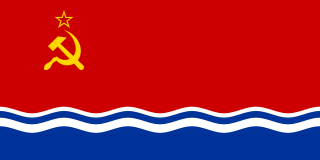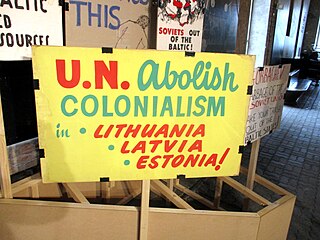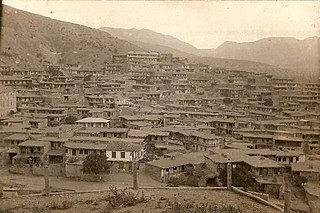Related Research Articles

The Latvian Soviet Socialist Republic, also known as Soviet Latvia, LaSSR or simply Latvia, was de facto one of the constituent republics of the Soviet Union between 1940–1941 and 1944–1990.

The occupation of the Baltic states was a period of annexation of Estonia, Latvia and Lithuania begun by the Soviet Union in 1940, continued for three years by Nazi Germany after it invaded the Soviet Union in 1941, and finally resumed by the Soviet Union until its dissolution in 1991.
Memorial is an international human rights organisation, founded in Russia during the fall of the Soviet Union to study and examine the human rights violations and other crimes committed under Joseph Stalin's reign. Subsequently, it expanded the scope of its research to cover the entire Soviet period. Memorial is the recipient of numerous awards, among others the Nobel Peace Prize in 2022.

From 1930 to 1952, the government of the Soviet Union, on the orders of Soviet leader Joseph Stalin and under the direction of the NKVD official Lavrentiy Beria, forcibly transferred populations of various groups. These actions may be classified into the following broad categories: deportations of "anti-Soviet" categories of population, deportations of entire nationalities, labor force transfer, and organized migrations in opposite directions to fill ethnically cleansed territories. Dekulakization marked the first time that an entire class was deported, whereas the deportation of Soviet Koreans in 1937 marked the precedent of a specific ethnic deportation of an entire nationality.

The Bosnian genocide took place during the Bosnian War of 1992–1995 and included both the Srebrenica massacre and the wider crimes against humanity and ethnic cleansing campaign perpetrated throughout areas controlled by the Army of Republika Srpska (VRS). The events in Srebrenica in 1995 included the killing of more than 8,000 Bosniak men and boys, as well as the mass expulsion of another 25000–30000 Bosniak civilians by VRS units under the command of General Ratko Mladić.

Tatjana Ždanoka is a Latvian politician and a Member of the European Parliament. She is co-chairwoman of the Latvian Russian Union and its predecessor parties since 1993. In 2024 she was accused of being a Russian intelligence agent since atleast 2004.
Vassili Makarovich Kononov or Vasiliy Makarovich Kononov was a Soviet partisan during World War II, who was convicted by the Supreme Court of Latvia as a war criminal. He is the only former Soviet partisan convicted of crimes against humanity.
Soviet deportations from Estonia were a series of mass deportations in 1941 and 1945–1953 carried out by Joseph Stalin's government of the former USSR from then Soviet-occupied Estonia. The two largest waves of deportations occurred in June 1941 and March 1949 simultaneously in all three occupied Baltic countries: Estonia, Latvia, and Lithuania. In addition, there were Soviet deportations from Estonia based on the victims' ethnicity and religion. Ethnic Estonians who had been residing in Soviet Russia had already been subjected to deportation since 1935.
The June deportation of 1941 was a mass deportation of tens of thousands of people during World War II from Estonia, Latvia, Lithuania, present-day western Belarus and western Ukraine, and present-day Moldova – territories which had been occupied by the Soviet Union in 1939–1940 – into the interior of the Soviet Union.

The three Baltic countries, or the Baltic states – Estonia, Latvia, and Lithuania – are held to have continued as independent states under international law while under Soviet occupation from 1940 to 1991, as well as during the German occupation in 1941–1944/1945. The prevailing opinion accepts the Baltic thesis that the Soviet occupation was illegal, and all actions of the Soviet Union related to the occupation are regarded as contrary to international law in general and to the bilateral treaties between the USSR and the three Baltic countries in particular.
Operation Priboi was the code name for the biggest Stalin-era Soviet mass deportation from the Baltic states on 25–28 March 1949. Also known as the March deportation. More than 90,000 Estonians, Latvians and Lithuanians, labeled as "enemies of the state", were deported to forced settlements in inhospitable Siberian areas of the Soviet Union. Over 70% of the deportees were either women or children under the age of 16.

Articles 4 and 114 of the Constitution of Latvia form the foundation for language policy in Latvia, declaring Latvian to be the official state language and affirming the rights of ethnic minorities to preserve and develop their languages. Livonian language is recognized as "the language of the indigenous (autochthon) population" in the Official Language Law, but Latgalian written language is protected as "a historic variant of Latvian." All other languages are considered foreign by the Law on State Language. Latvia provides national minority education programmes in Russian, Polish, Hebrew, Ukrainian, Estonian, Lithuanian, and Belarusian.
Andrejeva v. Latvia (55707/00) was a case decided by the Grand Chamber of the European Court of Human Rights in 2009. It concerned ex parte proceedings and discrimination in calculating retirement pensions for non-citizens of Latvia.
Perinçek v. Switzerland is a 2013 judgment of the European Court of Human Rights concerning public statements by Doğu Perinçek, a Turkish nationalist political activist and member of the Talat Pasha Committee, who was convicted by a Swiss court for publicly denying the Armenian genocide. He was sentenced to 90 days in prison and fined 3000 Swiss francs.
Olga Borisovna Kudeshkina is a Russian former judge of the first qualification class of the Moscow City Court, Candidate of Legal Sciences. She was deprived of the status of a judge after she made public allegations of political interference in the justice system of Russia.
The persecution of Jehovah's Witnesses in Russia refers to the Russian government's persecution of the Jehovah's Witnesses religious group. Following the collapse of the Soviet Union in 1991, Jehovah's Witnesses became legal after a long period of being banned, though have still faced widespread government interference in their activities. Jehovah's Witnesses were deported en masse to Siberia in 1951 under Stalin via Operation North.
Alfons Noviks was a Latvian Soviet state security official and politician.

Olga Alexandrovna Sadovskaya is a Russian lawyer, human rights activist, deputy head, and head of the International Legal Protection Department of the Crew Against Torture, a Russian human rights organization specializing in investigations of torture cases. Since 2004, she has been a co-author of alternative reports to the UN Committee Against Torture. Since 2018, she has been a member of the Board of the World Organization Against Torture. Since 2021, she has been a member of the Board of the Conference of International NGOs of the Council of Europe. Since 2022, she has been a member of the Council of Russian Human Rights Defenders.
References
- 1 2 Press release 380 (2014) European Court of Human Rights
- 1 2 Новости, Р. И. А. "Случаи судебного преследования советских ветеранов. Справка". РИА Новости (in Russian). Retrieved 2022-11-28.
- 1 2 "Soviet genocide suspect denies guilt". The Baltic Times. 10 November 2004.
- ↑ "КОММЕНТАРИЙ ДЕПАРТАМЕНТА ИНФОРМАЦИИ И ПЕЧАТИ МИД РОССИИ В СВЯЗИ С ВОПРОСОМ СМИ О РЕШЕНИИ ВЕРХОВНОГО СУДА ЛАТВИИ В ОТНОШЕНИИ ВЕТЕРАНА ВЕЛИКОЙ ОТЕЧЕСТВЕННОЙ ВОЙНЫ Н.В.ТЭССА" [Russian MFA Information and Press Department Commentary Regarding A Media Question About Latvian Supreme Court Decision On Great Patriotic War Veteran Nikolai Tess]. Ministry of Foreign Affairs (in Russian). 18 November 2004.
- ↑ Paton Walsh, Nick (18 December 2003). "Trials of Russians 'selective'". The Guardian.
- ↑ "Supreme Court upholds Tess' sentence". The Baltic Times. 11 November 2004.
- ↑ ECHR admissibility decision in case Tess v. Latvia (in French)
- ↑ "ECHR upholds convictions of KGB men". Latvian Public Broadcasting. 19 December 2014.